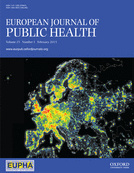-
PDF
- Split View
-
Views
-
Cite
Cite
Martin McKee, Johan P. Mackenbach, Peter Allebeck, Should a medical journal ever publish a political paper?, European Journal of Public Health, Volume 25, Issue 1, February 2015, Pages 1–2, https://doi.org/10.1093/eurpub/cku214
Close - Share Icon Share
Should a medical journal ever publish a political paper? This question has been debated at length in recent months following the publication by The Lancet of a letter drawing attention to the suffering of the victims arising from the recent conflict in Gaza.1 The initial letter stimulated a vast response, containing a wide range of views, many published in The Lancet and also in other journals2 and in the mass media. While the debate was, in part, about who was most responsible for the suffering, the government of Israel or the Hamas administration in Gaza, many questioned whether The Lancet should ever have published the letter in the first place. A frequent comment was that medical journals should stay out of politics.
This begs two questions. The first is when is a publication political? This is not as obvious as it might seem. The Lancet letter in question was indeed a letter, i.e. not submitted as an original manuscript and thus assumed to be tainted with opinion. But it was a letter drawing attention to conflict as a cause of premature death and disability—a link well-documented by recent versions of the Global Burden of Disease which explicitly include conflicts in their calculations.3 Just as it is possible to allocate deaths from proximal causes, such as cancer and cardiovascular disease to underlying causes, such as smoking and diet, so it is possible, and indeed highly appropriate, to allocate deaths from injuries to conflict. However, not only letters but also original manuscripts may be considered political, as The Lancet editors discovered when they published a paper estimating deaths from conflict in post-invasion Iraq.4 While counting deaths from wars in general is epidemiology, it seems that doing the same for specific conflicts, as in this case on Iraq, may be deemed to be political by some, especially those who identify with one party to the conflict.
Not only papers related to conflicts may be considered political. A number of years ago, the highly respected and influential editor of the JAMA, George Lundberg, was fired, because of a research article about college students’ definition of ‘having sex’, which the owners of the Journal asserted had been published in a hurry to coincide with the Clinton impeachment trial. Indeed, much of George Lundberg’s legacy has been an appreciation of him giving a place in JAMA for sensitive issues, such as tobacco, boxing and nuclear war.5
The second question is whether medical journals should ever stray into politics. Many public health professionals might wonder why such a question should even be asked. Those familiar with the history of public health will recall the work of the famous German pathologist Rudolph Virchow. When asked to investigate an epidemic of typhus in Silesia he focused his attention not on the immediate cause, infestation by lice, but rather the underlying conditions that allowed the epidemic to arise, which he identified as the power of the aristocracy.6 More recently, an extensive body of research has explored the political determinants of health, showing, for example, an association between left-party government and lower infant mortality.7
Yet, not everyone sees it this way. The American Diabetes Association has issued a statement, signed by the editors of a number of leading diabetes journals, that they ‘will refrain from publishing articles addressing political issues that are outside of either research funding or health care delivery’.8 It seems especially strange that it was the diabetes community that should feel it necessary to take this decision. While at a proximal level the global epidemic of type 2 diabetes is being driven by increased calorie intake, this increased intake is being driven by trade liberalisation, as markets are forced open to imports of energy dense foods.9 As the current debate about Trans-Atlantic and Trans-Pacific trade agreements clearly shows, debates about trade liberalisation are intensely political.
Any remaining doubts about whether there is a political dimension to diabetes were dispelled by an elegant study conducted in the USA, in which subjects were randomised to receive four different explanations for the aetiology of diabetes.10 A control group were offered no explanation. Three others were told that it was due to genetic influences, lifestyle choices and the social environment, respectively. Democrats who received the social environment explanation were more likely to support social policy responses than Republicans who received exactly the same information.
Virchow taught us that ‘Medicine is a social science and politics is nothing else but medicine on a large scale’. In a world where many of the determinants of disease are intensely political, it would be negligent of a medical journal to ignore these political determinants.6 In this respect, war is no different from the distribution of income or trade and regulation. Moreover, as the research on diabetes cited above shows, even if we think we are being rigorously objective and have excluded any political considerations from our decision-making, we are simply fooling ourselves.
Supplementary data
Supplementary data are available at EURPUB online.




Comments